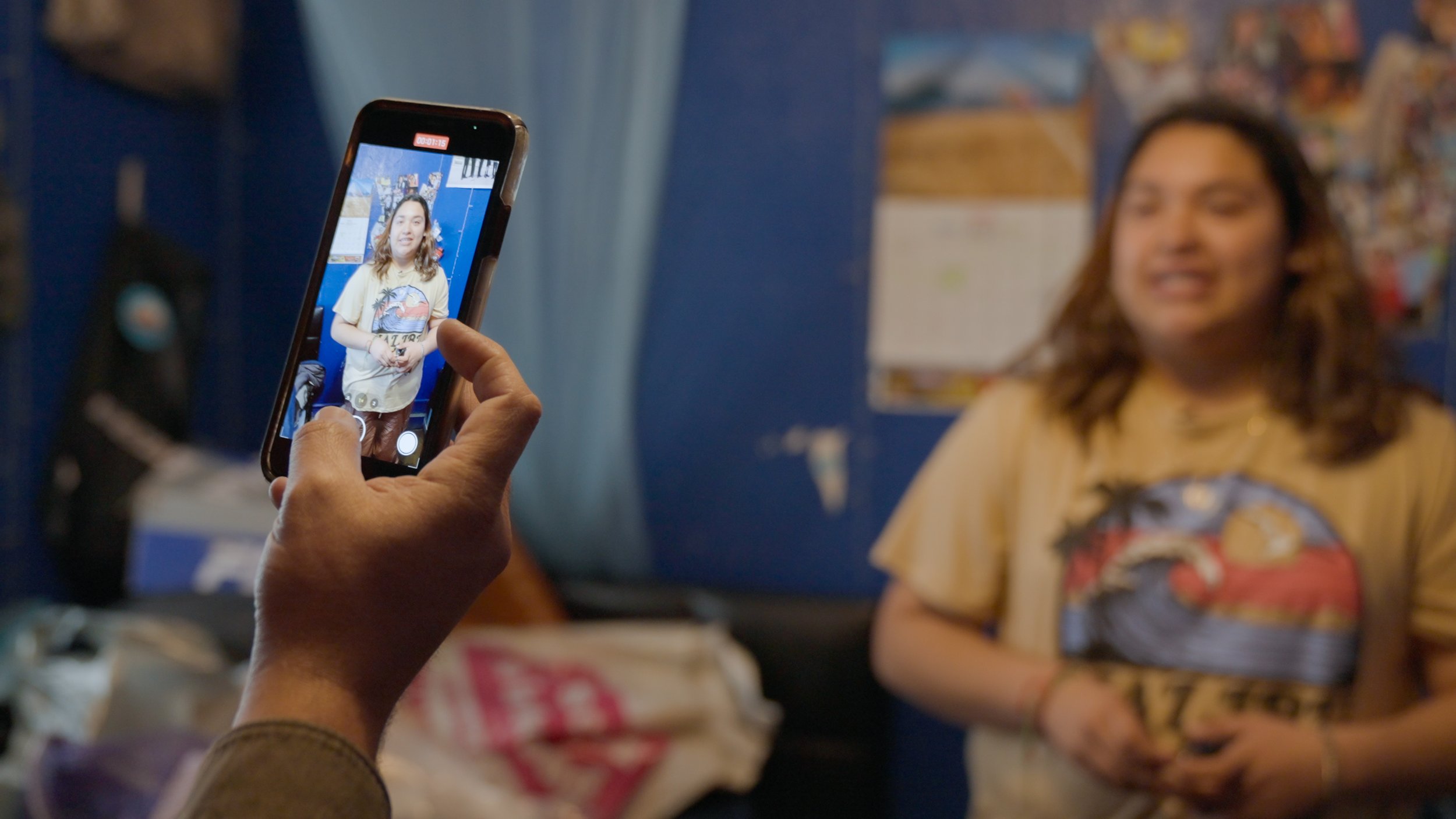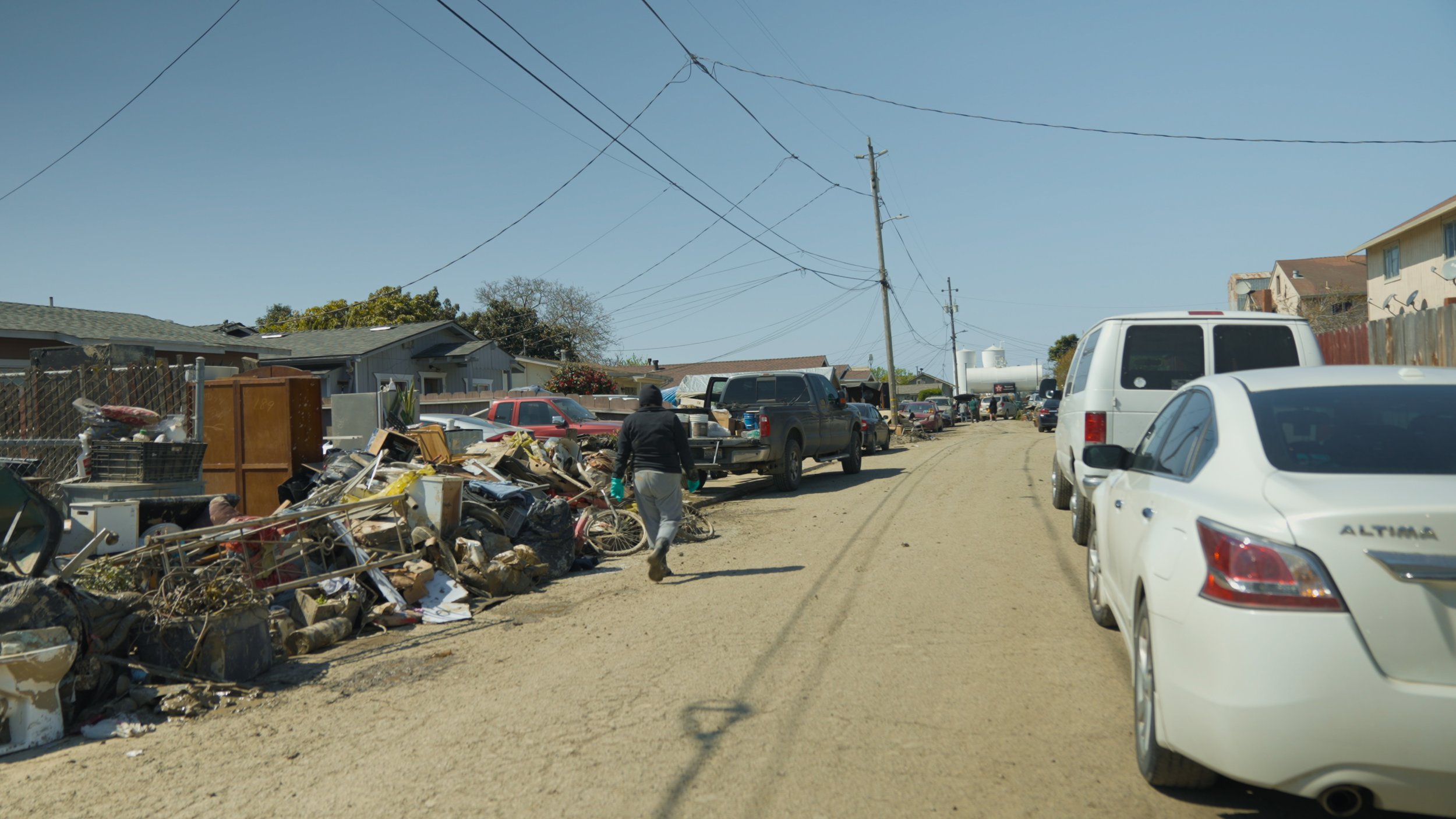TOO LITTLE TOO LATE
A documentary film.
When the Pajaro levee breaches, an already vulnerable community fights to keep what little they have from going under water.
See below for ways you can support this project.
Why Now:
Even though the Pajaro Valley levee never reached flood level status, it collapsed in the early hours of March 11, 2023. When we woke up to see the devastation unfolding in our backyard, at first we were concerned, then we jumped in our cars, ready to help. Seeing our family, friends, and neighbors leave their flooded homes, carrying their scared kids and few belongings, we started documenting. As the days went by, the stories of disparities started to surface, lending urgency to keep the voices of the community heard even as national media attention dissolved. The flood completely altered the town and had a deep impact on the hard-working people of the community, the businesses, and the environment. We want to shine light on the inequality they faced, how the system failed them, and how, nevertheless, the community continues to find ways to move forward together. This documentary will juxtapose the realities of climate, racial, and economic injustice as we head towards an unpredictable future of climate catastrophe.
In the days after the levee break, we were struck by a comment by displaced resident Laura Garcia, “Pajaro isn't on the list of places to save. It's an abandoned place.”
We are from this community. We have a strong bond and connection not only to tell this story, but to do it from a place of compassion. Our process will always be holistic and sensitive because these characters are our own family and friends. As the months have gone on, and the drama has dissipated, we've seen interest quickly fade from both media and government agencies who are supposed to help. We who are still here have to tell this story.
Directors Statement:
Seeing our family, friends, and neighbors leave their flooded homes, carrying their scared kids and whatever belongings they could, we started documenting not really knowing where this story could go, but we felt a sense of responsibility for telling the story of those who are usually unheard.
As the days went by, the stories of disparities started to surface. We recognized an urgency to keep the voices of the community heard as national media attention dissolved. We met Carla and Maria, who resemble our families a lot, and felt an instant connection. They let us join them as they went back to their homes for the first time and we witnessed desperation, tears, and broken dreams. Maria and her husband shared their anguish with us, expressing a feeling of complete emptiness as they surveyed their home's damages. After working their entire lives to establish a home for their family, one night swept it all away.
During the initial two weeks of evacuations, we signed up as volunteers at evacuation centers. There, we witnessed long lines under the cold rainy days, some grabbing as much as they could and others as little as possible since there was much uncertainty concerning what the next day would bring. Some stayed away from these sites as they feared legal documents were requested. The flood completely altered the town and had a deep impact on the hard-working people of the community, the businesses, and the environment.
Through this documentary, we want to tell the stories of Carla, Maria, and the people who were affected by the flood. We want to shine a light on the disparities they faced, how the system failed them, and the community that continues to unite and find ways to move forward together. This documentary will intersect the realities of climate, racial, and economic injustice as we head toward an unpredictable future of climate catastrophe. Our intention with this film is to inspire viewers to take preventative measures in their own communities by investigating and questioning their own leadership's planning for future climate disasters.
Creative Team
Carlos Campos - Director & Producer
Carlos Campos is a filmmaker born and raised in Watsonville, California and attended CSU Fresno where he obtained a bachelor's degree in Mass Communication and Journalism with an emphasis in Multimedia and later attended UC Santa Cruz where he obtained a Masters in Fine Art from the Social Documentation program.
Carlos’s journey began as a means to preserve and celebrate the stories, struggles and triumphs of the people who call Watsonville home. Carlos is not only a storyteller, but also a dedicated advocate for his community’s voice. His work has been showcased at various festivals like The Broadcast Education Association, Watsonville Film Festival and New York Latino Film Festival. He was an inaugural fellow for the Watsonville Film Festival’s Cine Se Puede Fellowship. His work exemplifies the power of visual storytelling for preservation, social change and empowerment. Carlos strives to inspire and enlighten his audience, inviting them to see the beauty of his community through a new perspective.
Eugenia Renteria - Director & Producer
Eugenia Renteria is a filmmaker and educator. Born and raised in a rural community in Zacatecas, Mexico, she moved to California when she was 12 years old. She attended CSU Monterey Bay and graduated with a B.A. in Cinematic Arts & Technology.
Eugenia wrote and directed Amor en Cuarentena, 13 Años, 9 Kilómetros, Strawberry Picker, and the award-winning documentary Tierra Fértil, which premiered at Mexico City's Cineteca Nacional and was later broadcasted at Mexico's Canal 22. Her work has been showcased at Mill Valley Film Festival, San Diego Latino Film Festival, San Francisco Latino Film Festival, New York Latino Film Festival, and ShortsMexico. She was an inaugural fellow for the Watsonville Film Festival’s Cine Se Puede Fellowship and is a PBS Ignite Mentorship for Diverse Voices mentee. Eugenia is the co-founder and owner of Inspira Studios.
María Victoria Ponce - Producer
Maria Victoria Ponce is a San Francisco Bay Area film writer, director and producer. Ponce’s work navigates the complexities in the routine lives within poor and working-class neighborhoods: themes of immigration, sexuality and coming of age tend to recur. Through film, she aims to highlight the breadth and depth of the Latine experience. Ponce has been a fellow at NALIP Latino Media Market, Sundance/WIF Financing Intensive, Film Independent Fast Track, SFFILM FilmHouse, Tribeca/AT&T Untold Stories, and PBS for “The Latino Experience.” Most recently she was named the Rainin Fellow in Film 2022 through the Kenneth Rainin Foundation.
Ponce has produced a number of projects, among them the indie features TORN and BEING US and the documentary ENGAGE HER. Engage Her follows minority women sharing their personal history and reasons for avoiding the political process; it features Congresswoman Barbara Lee, United Farm Workers co-founder Dolores Huerta, civil rights activist Aileen Hernandez, Voto-Latino founder Maria Teresa Kumar, and internment camp survivor Margaret Ouye.
Alex Santana Jr - Associate Producer
Alex Santana Jr is a Queer Mexican-American filmmaker from Watsonville, CA. Through audio stories and documentary portraits, Alex leverages his experience as multimedia professional to preserve unique narratives. To him, every personal legacy has value. He approaches his work intentionally and is driven by stories that influence change.
Paco Serrano - Editor
Paco is a post-producer and editor born and raised in Mexico City. He graduated from Universidad del Valle de México with a Bachelor’s degree in Communication Sciences. He worked in post-production agencies in México editing and delivering advertising pieces for clients, such as Siemens, Audi, Herdez and Bimbo. Paco also developed a love for photography and filmmaking. Currently, he works in the Central Coast as a freelance editor and cinematographer.
Help us tell this important story. Your donation will help further finish the production and distribution cost.
or scan the QR code


















